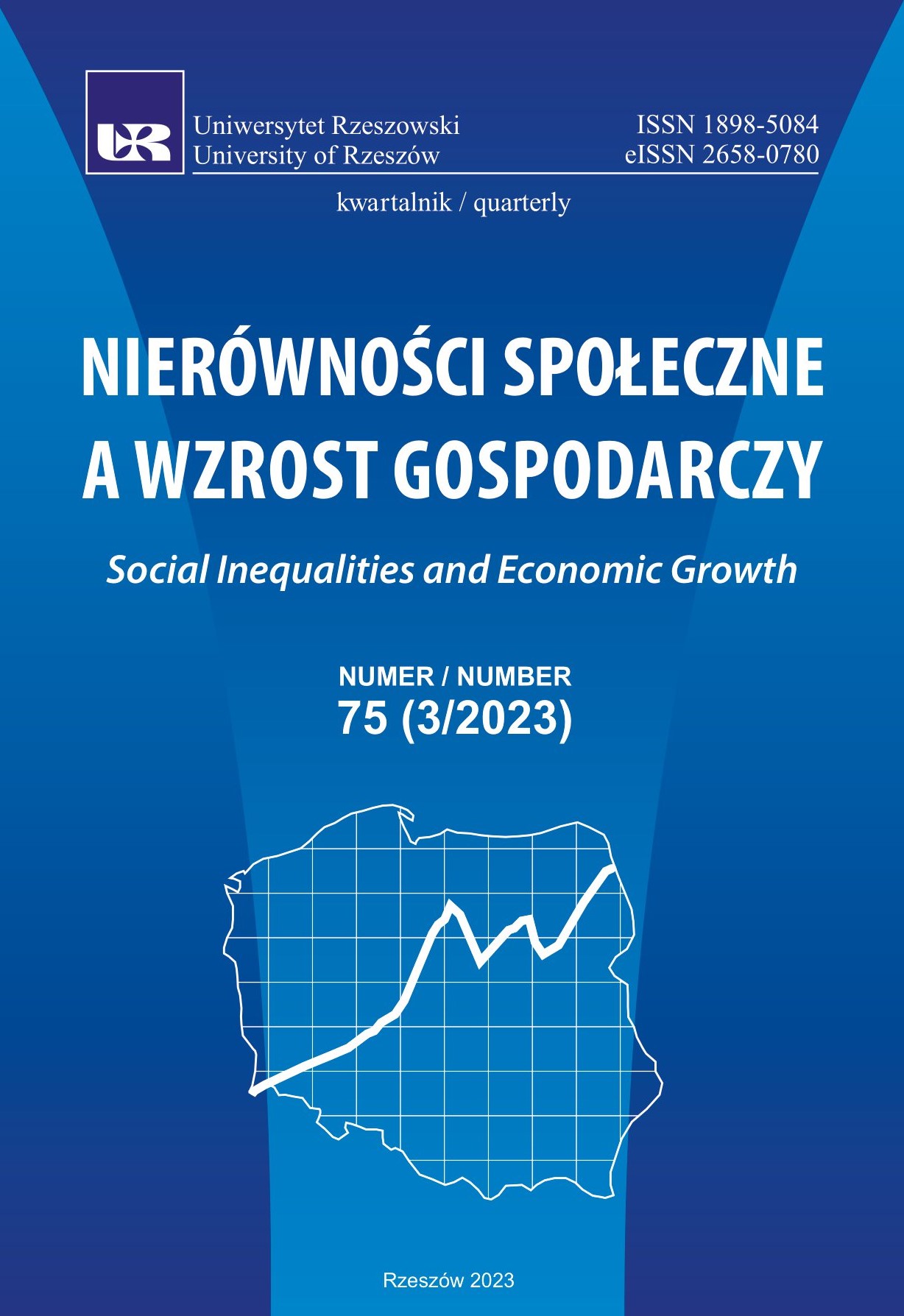The place of culture in sustainable development of European countries – homogeneity or diversity of the phenomenon?
DOI:
https://doi.org/10.15584/nsawg.2023.3.9Keywords:
culture, sustainable development, diversity, European countriesAbstract
The aim of this paper is to evaluate the level of sustainable development in selected European countries – taking into account its economic, social, environmental and cultural dimensions, as well as the level of diversification of the phenomenon in the entities under analysis. The analysis assumes that culture has a positive impact on sustainable development measures. The selection of countries was based on indicators of their ethnic and cultural diversity. The time range of the analysis is 2012 and 2019, and the data source was the Eurostat database. A taxonomic method (linear ordering method) was used in the analysis of the research problem. The achievement of the aim was determined by limitations in the selection of indicators and the availability and validity of data in European statistics. Based on research to date, it can be concluded that, in the cultural aspect, the same number of countries presented a very high and high level of sustainable development (5) as those presenting a low and very low level (5). The cultural aspect has substantially greater meaning for the sustainability development of the countries characterised by high cultural diversity.
Taking this aspect into account while conducting analyses makes it possible use the most valuable, endogenous characteristics of a given population for forging an effective relationship with the other elements of sustainable development.
Downloads
References
Bacchini, F., Valentino, P. (2020). Culture for a sustainable development: from theory to evidence. Economia della Cultura, 3–4, 413–424. DOI: 10.1446/100734.
Bervar, M. (2019). Importance of Culture for Sustainable Development. Managing Global Transitions, 17(3), 195–209. DOI: 10.26493/1854-6935.17.195-209. DOI: https://doi.org/10.26493/1854-6935.17.195-209
Borys, T. (2005). Wąskie i szerokie interpretacje zrównoważonego rozwoju oraz konse¬kwencje wyboru. In: A. Papuziński (ed.), Zrównoważony rozwój. Od utopii do praw człowieka (pp. 64–75). Bydgoszcz: Oficyna Wydawnicza Branta.
Dümcke, C., Gnedovsky, M. (2013). The Social and Economic Value of Cultural Heritage: literature review. European Expert Network on Culture (EENC). Retrieved from: https://www.interarts.net/descargas/interarts2557.pdf (2023.07.19).
EUROSTAT. (2022). Retrieved from: https://ec.europa.eu/eurostat/web/main/data/database (2023.07.19).
Florida, R. (2010). Narodziny klasy kreatywnej: oraz jej wpływ na przeobrażenia w charakterze pracy, wypoczynku, społeczeństwa i życia codziennego. Warsaw: Narodowe Centrum Kultury.
Fukuyama, F. (1997). Zaufanie: kapitał społeczny a droga do dobrobytu. Warsaw: PWN.
Giraud-Labalte, C., Pugh, K., Quaedvlieg-Mihailović, S., Sanetra-Szeliga, J., Smith, B., Vandesande, A., Thys, C. (2015). Cultural Heritage Counts for Europe. Full Report. Kraków: International Cultural Centre, CHCFE Consortium.
Glinka, B. (2008). Kulturowe uwarunkowania przedsiębiorczości w Polsce. Warsaw: PWN.
Harrison, L. E., Huntington, S. P. (ed.). (2003). Kultura ma znaczenie. Jak wartości wpływają na rozwój społeczeństwa. Poznań: Wydawnictwo Zysk i S-ka.
Kistowski, M. (2003). Regionalny model zrównoważonego rozwoju i ochrony środowiska Polski a strategie rozwoju województw. Gdańsk-Poznań: Wydawnictwo Naukowe Bogucki.
Klonowska-Matynia, M., Radlińska, K. (2018). Przestrzenne zróżnicowanie zrównoważonego rozwoju wybranych krajów europejskich. Hierarchia i klasyfikacja krajów. Middle Pomeranian Scientific Society of the Environment Protection, 20/2, 1372–1385.
Krzyminiewska, G. (2010). Kultura ekonomiczna młodzieży wiejskiej i jej znaczenie w rozwoju społeczno-gospodarczym obszarów wiejskich. Poznań: Wydawnictwo Uniwersytetu Ekonomicznego.
Krzyminiewska, G., Pondel, H. (2017). The Role of Culture in the Sustainable Development of Voivodships in Poland. Economic and Environmental Studies, 17/4(44), 1017–1034. DOI: 10.25167/ees.2017.44.24. DOI: https://doi.org/10.25167/ees.2017.44.24
Landes, D. (2000). Bogactwo i nędza narodów. Dlaczego jedni są tak bogaci a drudzy tak ubodzy. Warsaw: Muza.
Łogwiniuk, K. (2011). Zastosowanie metod taksonomicznych w analizie porównawczej dostępu do infrastruktury ICT przez młodzież szkolną w Polsce. Economy and Management, 1, 7–23.
Matarasso, F. (1997). Use or Ornament? The Social Impact of Participation in the Arts. Stroud (UK): Comedia.
Mehdinezhad, J., Nabi., R. N. (2016). Investigating cultural and social sustainability in renovation and durability of vernacular buildings of Iran’s architecture (case study: Bazaar of tabriz). IIOAB Journal, 7(4), 486–495.
Nawojczyk M. (2009). Przedsiębiorczość. O trudnościach w aplikacji teorii. Kraków: Wydawnictwo Namos.
Nazarko, J., Dobrzyński, M. (2006). Zrównoważony rozwój – podejście holistyczne. In: E.K. Czech (ed.), Uwarunkowania ochrony środowiska. Aspekty krajowe, unijne, międzynarodowe (pp. 15–28). Warsaw: Difin.
Olejnik, I. (2006). Wielowymiarowa analiza zróżnicowania przestrzennego rozwoju handlu w Polsce. In: J. Mikołajczyk (ed.), Handel – znaczenie we współczesnej gospodarce (pp. 195–202). Poznań: Wydawnictwo Naukowe Wyższej Szkoły Handlu i Usług.
Pascual, J. (2009). Polityki kulturalne, rozwój społeczny i innowacyjność́ instytucjonalna, czyli: dlaczego potrzebujemy Agendy 21 dla kultury? In: W. Kłosowski (ed.), Kierunek Kultura. Promocja regionu przez kulturę̨ . Warsaw: Mazowieckie Centrum Kultury i Sztuki.
Plebańczyk, K. (2018). Role kultury we współczesnych strategiach rozwoju zrównoważonego. Studia Ekonomiczne. Zeszyty Naukowe Uniwersytetu Ekonomicznego w Katowicach, 376, 163–181.
Pondel, H. (2021). An attempt to evaluate the level of sustainable development in European Union countries. Ekonomia i Prawo. Economics and Law, 20(2), 383–399. DOI: 10.12775/EiP.2021.023. DOI: https://doi.org/10.12775/EiP.2021.023
Soini, K., Birkland, I. (2014). Exploring the scientific discourse on cultural sustainability. Geoforum, 51, 213–223. DOI: 10.1016/j.geoforum.2013.12.001. DOI: https://doi.org/10.1016/j.geoforum.2013.12.001
Streimikiene, D., Mikalauskiene, A., Kiausiene, I. (2019). The Impact of Value Created by Culture on Approaching the Sustainable Development Goals: Case of the Baltic States. Sustainability, 11, 6437. DOI: 10.3390/su11226437. DOI: https://doi.org/10.3390/su11226437
Throsby, D. (2010). The Economics of Cultural Policy. Cambridge University Press. DOI: https://doi.org/10.1017/CBO9780511845253
UNESCO. (2013). Placing Culture at the Heart of Sustainable Development Policies. Retrieved from: https://www.unesco.pl/fileadmin/user_upload/pdf/Konwencja_w_sprawie_promowania_roznorodnosci.pdf (2023.07.19).
Weber, M. (2002). Gospodarka i społeczeństwo. Warsaw: PWN.
WORLD BANK. (2022). Renewable Energy consumption (% of total final Energy consumption) – Switzerland. Retrieved from: https://data.worldbank.org/indicator/EG.FEC.RNEW.ZS?locations=CH (2023.07.17).
Zenderowski, R. (2019). Od państwa multietnicznego do państwa monoetnicznego. Bilans polskich i węgierskich doświadczeń (1918–2018). In: Od radości do dramatu. Lata 1918–1920 w odbiorze polskim i węgierskim. Conference materials. Budapest: Instytut Współpracy Polsko-Węgierskiej. Retrieved from: https://www.researchgate.net/publication/348550243_Od_panstwa_multietnicznego_do_panstwa_monoetnicznego_Bilans_polskich_i_wegierskich_doswiadczen_1918-2018 (2023.07.20).
Downloads
Published
How to Cite
Issue
Section
License
Copyright (c) 2024 University of Rzeszow

This work is licensed under a Creative Commons Attribution-ShareAlike 4.0 International License.


